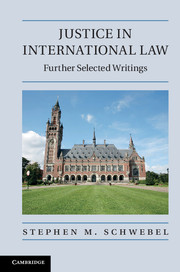Book contents
- Frontmatter
- Contents
- PART I International Court of Justice
- PART II International arbitration
- 12 A BIT about ICSID
- 13 The influence of bilateral investment treaties on customary international law
- 14 The United States 2004 Model Bilateral Investment Treaty: an exercise in the regressive development of international law
- 15 The United States 2004 Model Bilateral Investment Treaty and denial of justice in international law
- 16 Anti-suit injunctions in international arbitration: an overview
- 17 The law applicable in international arbitration: application of public international law
- 18 The validity of an arbitral award rendered by a truncated tribunal
- 19 The authority of a truncated tribunal
- 20 Injunction of arbitral proceedings and truncation of the tribunal
- 21 Public policy and arbitral procedure
- 22 The creation and operation of an International Court of Arbitral Awards
- 23 The Kingdom of Saudi Arabia and Aramco arbitrate the Onassis Agreement
- 24 The Southern Bluefin Tuna case
- 25 A celebration of the United Nations New York Convention on the Recognition and Enforcement of Foreign Arbitral Awards
- 26 Does the consent of the Contracting Parties govern the requirement of an “investment” as specified in Article 25 of the ICSID Convention?
- PART III Miscellaneous
- Collected publications, judicial opinions and book reviews
- Index
22 - The creation and operation of an International Court of Arbitral Awards
from PART II - International arbitration
Published online by Cambridge University Press: 07 September 2011
- Frontmatter
- Contents
- PART I International Court of Justice
- PART II International arbitration
- 12 A BIT about ICSID
- 13 The influence of bilateral investment treaties on customary international law
- 14 The United States 2004 Model Bilateral Investment Treaty: an exercise in the regressive development of international law
- 15 The United States 2004 Model Bilateral Investment Treaty and denial of justice in international law
- 16 Anti-suit injunctions in international arbitration: an overview
- 17 The law applicable in international arbitration: application of public international law
- 18 The validity of an arbitral award rendered by a truncated tribunal
- 19 The authority of a truncated tribunal
- 20 Injunction of arbitral proceedings and truncation of the tribunal
- 21 Public policy and arbitral procedure
- 22 The creation and operation of an International Court of Arbitral Awards
- 23 The Kingdom of Saudi Arabia and Aramco arbitrate the Onassis Agreement
- 24 The Southern Bluefin Tuna case
- 25 A celebration of the United Nations New York Convention on the Recognition and Enforcement of Foreign Arbitral Awards
- 26 Does the consent of the Contracting Parties govern the requirement of an “investment” as specified in Article 25 of the ICSID Convention?
- PART III Miscellaneous
- Collected publications, judicial opinions and book reviews
- Index
Summary
In these days of proliferation not only of international litigation but of international courts, there may seem room to question the utility of establishing another court of the kind just proposed by Howard Holtzmann: an international court to resolve disputes which arise over challenges to the validity of international commercial arbitral awards.
Judge Holtzmann's proposal would, inter alia, remove from national courts the decision which today is theirs under the New York Convention on the Recognition and Enforcement of Foreign Arbitral Awards to decide on the specified, limited grounds on which recognition and enforcement of an arbitral award may be refused under the Convention. Among those grounds is whether the subject-matter of the dispute is not capable of settlement by arbitration under the law of the State in which the national court sits, and whether recognition or enforcement of the award would be contrary to that State's public policy. The new International Court of Arbitral Awards would have exclusive jurisdiction to determine all these questions. But execution of its decisions will necessarily still rest with national authorities.
Is there a need for such a new court? There is, by way of notable example, no reason in principle why the International Court of Justice cannot resolve disputes about the validity of international arbitral awards, if those disputes arise on, or are raised to, the inter-State level – as, exceptionally, some such disputes have or have been.
- Type
- Chapter
- Information
- Justice in International LawFurther Selected Writings, pp. 246 - 254Publisher: Cambridge University PressPrint publication year: 2011
- 1
- Cited by



